#all scriptures are profitable
Explore tagged Tumblr posts
Text
Scripture of the day. August 1/8/2023
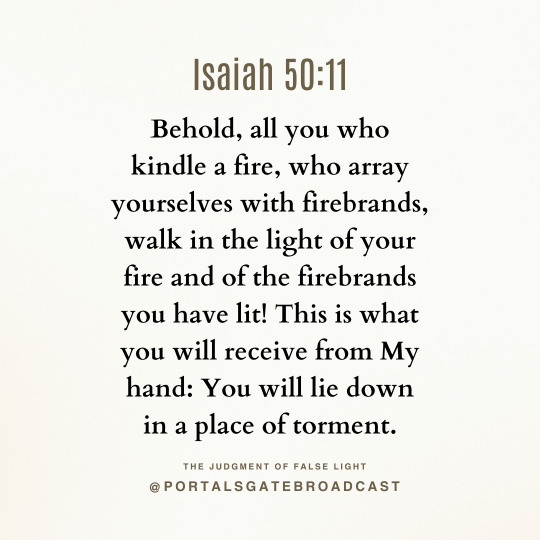
View On WordPress
#all scriptures are profitable#False light#false ministry#God&039; word#Le God&039;s word speak#Meditating on the word#portalsgate#scripture for the day#The book Isaiah
0 notes
Text
2 Timothy 3:16 Only Book Needed
All Scripture is given by the inspiration of God, and is profitable for doctrine, for reproof, for correction, for instruction in righteousness, 2 Timothy 3:16 Bookstores and libraries are packed with books to help a person in nearly everything and anything desired. Rows upon rows of self-help books fill the stores. People are always searching for answers on how to do something or deal with some…

View On WordPress
#2 Timothy 3:16#Bible#book for all#Correction#doctrine#inspiration of God#Instruction#one book#Profitable#Reproof#righteousness#Scripture
0 notes
Text

You know how sometimes the stupidest shit will be happening and you'll suddenly understand something people have been telling you for years?
So yeah (because I have this theory that Cyndi Lauper is awesome enough to redeem even obvious mistakes) I was watching Life with Mikey and this line (and a great read my MJF doing some heavy lifting in a waste of film even Nathan Lane is kinda phoning in) came out and I had to pause the movie and tell you about it. Because that's it, right? That's the other side of the glass that rescues us all from

#i don't know#i've been looking into the bagavad gita and generally going through a strange time#and keep bumping into this absolutely dumb shit that i still have to like take a walk and process#i have read just about every major philosopher and scripture at some point#and here i am having thoughts about a michael j fox movie from the fucking 1990s with 25% on rotten tomatoes#i swear to god i am two sleepless nights away from believing the hokey pokey is what it's all about after all#so like if this life is just a temporary manifestation of some larger thing and what i usually mean when i say ''I'' isn't really a thing#(an idea i find to be both self-evident and demonstrably true if not necessarily in the originally intended sense)#then what's the fucking point of anything? why does any of it matter?#i remember reading at one point someone asked the dalai lama how do we find calmness and living in a stressful world run for profit#and the dalai lama laughed and said not to ask such difficult questions#how do you know when to fight and when to accept?#but maybe this is the wrong question to ask in a temporary situation
1 note
·
View note
Text
The Bible is Profitable for Teaching, Conviction, Correction, Instruction in Righteousness
On God’s side, the Bible is God’s breathing; on our side, the Bible is for us to receive the breath of God as our profit in teaching, conviction, correction, and instruction in righteousness; the Bible is profitable for teaching, conviction, correction, and instruction in righteousness, so that we may be men of God fully equipped for every good work. Amen! The majority of believers in Christ…
#2024 April ITERO#2024SITEROw5d3#426#799#902#all Scripture is God-breathed#breathe in God&039;s word#convicted and reproved#deny ourselves#holy word for morning revival#instruction in righteousness#read the Bible#the Bible is profitable#the Bible is profitable for correction#the Bible is profitable for teaching#Witness Lee
0 notes
Photo
Before all else fails, go to the Book of Books!

347 notes
·
View notes
Text
TYPES OF FANS TO SCRIPT IN YOUR DR ! ⋆𐙚₊˚⊹♡

hey loves! I decided to make this post for all the shifters who have fame drs! I personally think the idea of specifically scripting how people in your fandom are is a very cool idea, might be extra for some people but me... I enjoy scripting every detail of every crevice lmao anyways I hope you guys enjoy! :)
⋆⛧┈┈┈┈﹤୨♡୧﹥ ┈┈┈┈⛧⋆
THE CULT-LIKE DEVOTEES ♡ //
This faction of the fandom doesn’t just admire the person they stan—they worship them. To these fans, their favorite celebrity is more than an artist; they are a living deity. Over time, they have built an entire belief system around their idol, complete with sacred rituals, celebratory holidays, and unofficial scriptures containing their most iconic quotes, song lyrics, and interviews.
Their gatherings resemble religious ceremonies, where they discuss their idol’s achievements as if they were divine miracles. Some members have gone as far as to tattoo symbols or words associated with their idol onto their bodies, believing it connects them to something greater than themselves. They refer to their fandom as a spiritual movement, and excommunication is the only punishment for anyone caught disrespecting or doubting their leader.
Critics often debate whether this level of devotion is concerning, but despite the cult-like aura, these fans remain organized, influential, and fiercely protective of their idol. They ensure their favorite celebrity's career flourishes, and their sheer numbers make them a dominant force in the entertainment industry.
THE RICH ELITE FANS ♡ //
While some fans support their favorite artist by streaming their music and buying albums, this particular group takes things to an entirely different level. These fans are wealthy, and when they spend, they spend big. They are the type to single-handedly buy out entire album stocks, ensuring their idol dominates every chart. If their favorite celebrity announces a concert, they purchase thousands of tickets, sometimes just to prevent scalpers from profiting off of them.
Money is not an issue for them, and they use their financial power to uplift their idol’s career in ways no ordinary fan could. They fund expensive projects, purchase extravagant birthday gifts, and even invest in massive advertising campaigns—Times Square billboards, Super Bowl commercials, and magazine covers promoting their favorite artist are all courtesy of them.
Beyond financial support, these fans are also highly connected. Some are CEOs, politicians, or heirs to powerful families, capable of pulling strings in ways most people can’t even imagine. If a brand disrespects their idol, that company will suffer—whether it be from an organized boycott or an unexplained financial downfall. The industry knows better than to cross them.
THE UNHINGED STANS ♡ //
These fans are chaos in human form. Their minds work in ways that no one can fully comprehend, and their humor is so unhinged that outsiders often find themselves both horrified and entertained by their antics.
They are known for flooding social media with the wildest takes, creating viral memes, and saying things that toe the line between absurdly funny and completely insane. One moment, they are writing detailed analyses about their idol’s artistic impact, and the next, they are threatening to physically fight anyone who so much as breathes in the direction of a hater.
Their obsession manifests in strange but hilarious ways—some have entire rooms dedicated to their idol, while others write fanfiction so outlandish that it becomes infamous across multiple fandoms. They are unpredictable, unstoppable, and absolutely terrifying to those who don’t understand their sense of humor.
The best part? Their loyalty is unwavering. They would go to war for their idol without hesitation, and their dedication is so intense that even non-fans can't help but be entertained by them.
THE LOYAL PROTECTORS ♡ //
Unlike casual fans, who simply enjoy an artist’s work, these fans treat their idol’s career as a mission. They are not just supporters—they are defenders.
Their digital archives contain years’ worth of receipts, ready to be deployed the moment a scandal or accusation arises. If someone tries to cancel their favorite celebrity, they will immediately launch a well-researched counterattack, using past statements, statistics, and undeniable proof to dismantle the opposition.
Beyond their skills in damage control, they have infiltrated various online communities, industry circles, and even entertainment journalism. Many of them work as PR professionals, social media strategists, and content moderators, ensuring that their idol's reputation remains spotless. Some even maintain direct contact with their celebrity, acting as unofficial advisors when necessary.
Their presence is so strong that public figures fear speaking against their idol, knowing full well that the backlash will be swift and merciless.
THE SECRET SOCIETY OF FANS ♡ //
While most fandoms operate openly, this particular group thrives in the shadows. Their identities remain a mystery, and their influence is whispered about rather than publicly acknowledged.
No one knows exactly who they are, but their actions suggest they are high-ranking individuals in society. Some believe they are government officials, elite hackers, or powerful industry insiders who have taken a personal interest in ensuring their idol’s success.
Their methods are calculated and often untraceable. If a journalist writes a negative article, it mysteriously disappears within hours. If an enemy tries to sabotage their idol’s career, their own reputation suddenly crumbles without explanation. Some conspiracy theorists even claim that this group has rigged award shows, manipulated voting polls, and orchestrated industry shifts to benefit their chosen celebrity.
Their existence remains unconfirmed, but the evidence of their work is undeniable.
THE SUPER INTELLECTUALS ♡ //
While most fandoms contain passionate supporters, this group consists of some of the most intelligent individuals on the planet. Professors, researchers, and literary scholars dedicate their time to analyzing their idol’s work, treating every piece of content as though it were a classic novel or historical document.
They have convinced universities to offer courses on their idol’s artistic influence, written peer-reviewed articles about their impact, and even debated industry professionals on their significance. Their level of analysis is so detailed that even skeptics begin to question whether their idol is actually a misunderstood genius.
Every time their idol releases new content, they dissect it in ways no one else would even consider—breaking down themes, symbols, and deeper meanings that casual fans overlook. If anyone dares to claim their idol isn’t talented, they will effortlessly destroy them with a dissertation-level argument.
THE MEDIA MANIPULATORS ♡ //
These fans are masters of digital warfare. They control the internet with terrifying efficiency, making sure that every narrative surrounding their idol benefits them.
They know exactly how to manipulate social media algorithms, ensuring that positive news about their idol dominates trending pages while negative press is buried within minutes. They flood comment sections, report harmful content, and flood search results with favorable articles.
Many of them work within the media industry themselves—journalists, social media managers, and digital marketers who understand how to sway public opinion. Their work is so seamless that most people don’t even realize they’re being influenced.
THE FANATICAL STREAMERS ♡ //
To these fans, streaming is a science. They have developed complex algorithms, spreadsheets, and AI tools to maximize their idol's streaming numbers.
They hold scheduled streaming marathons, coordinate across different time zones, and organize mass listening events. They even educate new fans on the most efficient ways to stream to ensure chart dominance. Some have gone as far as to create automated streaming bots, making sure their idol's music is never off the charts.
Their dedication is so extreme that even music industry executives acknowledge their impact.
THE AESTHETIC CULTURE CREATORS ♡ //
These fans determine what’s cool. They create stunning fan edits, viral TikTok trends, and fashion movements inspired by their idol. Other fandoms copy them, influencers follow their lead, and brands scramble to appeal to their aesthetic.
Their work is so influential that even people who don’t listen to their idol’s music still engage with their content.
THE CELEBRITY CONVERTORS ♡ //
Their goal? Make everyone a fan. They strategically target influencers, actors, and musicians, ensuring that their idol’s reach extends into every corner of pop culture.
They have converted entire celebrities into die-hard stans, leading to unexpected collaborations, viral moments, and industry-wide recognition. Even those who initially had no interest in their idol eventually find themselves drawn in.
Hope you guys found this helpful, requests are appreciated! <3

#fame dr#fame desired reality#kpop dr#kpop desired reality#idol dr#idol#idol desired reality#shifting#shifting realities#shifting blog#shifter#shifting community#reality shifting#shifters#shifting consciousness#shifting motivation#shifting antis dni#shiftingrealities#shiftblr#manifestation#loa blog#desired reality#dr#desired realities#reality shifter#quantum jumping#shifting help#shifter helping#shifting template#shifting script template
52 notes
·
View notes
Photo

Solomon
According to biblical tradition (and some say myth), King Solomon was the third and last king in the ancient United Kingdom of Israel. Other faiths, such as Islam and Rastafarianism, also embrace the notion of Solomon as a sagacious king and powerful prophet of Israel. He was renowned for his wisdom, his prolific writings, and his building accomplishments. Born around 1010 BCE, Solomon was the tenth son of King David (the second king of ancient united Israel) and the second son of Bathsheba. Like King Saul and King David, King Solomon reigned for 40 years in one of the highest and most prosperous periods in Israel's history - called by many, “The Golden Age” of Israel.
During his reign, Solomon controlled the trade routes coming out of Edom, Arabia, India, Africa, and Judea; he constructed an elaborate and profitable web of alliances (cemented by an enormous assemblage of hundreds of wives and concubines), and he purportedly built the first Temple of God in Jerusalem, which was destroyed (along with the entire city of Jerusalem) by the Babylonians in 586 BCE. Despite initial sovereign successes, the end of Solomon's rule was marked by several insurrections and attacks from both foreign and domestic enemies, as well as a disintegration of national and religious integrity because of cultural appeasements within Israel, which compromised and weakened the social fabric of the United Kingdom. He died in 931 BCE at age 80, possibly the most prosperous and productive king ever to rule over Israel.
The Traditional Story of King Solomon
The story of King Solomon begins with his father, King David, and his mother, Bathsheba. In the Hebrew scriptures, 2 Samuel 3 states that King David, anointed by the Prophet Samuel before King Saul's demise to be his replacement, officially became King of Judea (1010 BCE). Later, 2 Samuel 5 states that (in 1002 BCE) all the elders of Israel approached him to be their ruler, and “The king made a covenant with them at Hebron before the Lord, and they anointed David king over Israel.” King David's reign lasted 40 years, and like King Saul, it started off better than it ended.
David's initial zeal for God and for ethical integrity paved the way for his early fame and fortune, although being a man of warfare and blood (according to the scriptures), God decided that David was not suitable to be the one to build God's Temple (that would be placed in the hands of his son, Solomon). Moreover, David's illicit affair and subsequent devious actions (leading to the assassination of Uriah the Hittite and its cover-up) complicated the rest of David's reign - along with the rape of Tamar, the murder of Ammon, and the attempted coup of Absalom, among other controversies.
By the end of David's life, he had lost touch with Israelite society and eventually lost political control of it, as well. This led to an attempted coup by his son, Adonijah (whose mother was Haggith, David's fifth wife), who proclaimed himself to be king with the assistance of General Joab and Abiathar the Priest; however, the majority of Israel's institutional agents did not support Adonijah's claim. The Hebrew scriptures state that the Prophet Nathan went first to Bathsheba to alert her to Adonijah's usurpation of the throne, who then went to her husband, King David, to break the troubling news to him. Eventually, the Prophet Nathan joined the two, and King David officially made Solomon his heir apparent. David said, “Assuredly Solomon your son shall be king after me, and he shall sit on my throne in my place” (1 Kings 1).
Continue reading...
32 notes
·
View notes
Text

Good Morning!☀
But the Comforter, which is the Holy Ghost, whom the Father will send in my name, he shall teach you all things, and bring all things to your remembrance, whatsoever I have said unto you. John 14:26
All scripture is given by inspiration of God, and is profitable for doctrine, for reproof, for correction, for instruction in righteousness: 2 Timothy 3:16
Jesus had spent approximately three years preparing his disciples for the work he called them to. He first gave them a foundation through teaching. He combined this with instruction and demonstration. Now on his last night with them before the cross, he let them know that there was one more asset they would need to complete the task ahead of them: the Holy Spirit.
Jesus knew that we are prone to forget what we are taught if it is not reinforced by repetition. He also knew that we would need the power to stand for him in a sin-laden world and understand his word.
The disciples were told they would be given the Holy Spirit upon Jesus's departure. He would enable them to remember all they were taught, lead them in all truth, and give them the power to be witnesses for him under all circumstances. (John 15:26-27, John 16:13-16, Acts 1:8)
So that we might continue to learn what God expects of us, he left us his word, written by men but inspired or breathed by the Spirit for "doctrine, reproof, correction, and instruction in righteousness". (2 Timothy 3:16) With this potent combination of His Spirit and his word we have all we need to be who he wants us to be!
30 notes
·
View notes
Text

2 Timothy 3:14-17 (ESV). [14] “But as for you, continue in what you have learned and have firmly believed, knowing from whom you learned it [15] and how from childhood you have been acquainted with the sacred writings, which are able to make you wise for salvation through faith in Christ Jesus. [16] All Scripture is breathed out by God and profitable for teaching, for reproof, for correction, and for training in righteousness, [17] that the man of God may be complete, equipped for every good work.”
“Discovering God’s Will” by In Touch Ministries:
“The Lord is actively working to create something beautiful with our life.”
“God wants His children to obey Him and make right decisions, so He accepts full responsibility for guiding us. In fact, He promises, “I will instruct you and teach you in the way which you should go” (Psalm 32:8). However, our lifetime isn’t mapped out in an instruction manual to read in its entirety the day we’re saved. Following God’s will is a daily process of trust.
We learn God’s will by reading His Word. There we find rules and commands that will lead to our success and principles for daily application. The Bible doesn’t detail every possible situation we might face, but its principles equip us to make decisions about any and every circumstance we encounter. Studying God’s Word is the only way for a believer to recognize His will. Today’s passage says the sacred writings can give us the wisdom we need in order to be fully capable and equipped for the work God wants us to accomplish (vv. 15, 17).
Our heavenly Father is actively guiding every incident of our life, stitching the seemingly unrelated “threads” together to create something beautiful. As believers, we must be listening so we can discern when He’s revealing His will. Pray every day that He’ll make you sensitive to His ways.”
[Photo thanks to Cristina Anne Costello at Unsplash]
#2 timothy 3:14-17#god's will#will of god#following god's will#god loves you#bible verses#bible truths#bible scriptures#bible quotes#bible study#studying the bible#the word of god#christian devotionals#daily devotions#bible#christian blog#god#belief in god#faith in god#jesus#belief in jesus#faith in jesus#christian prayer#christian life#christian living#christian faith#christian inspiration#christian encouragement#christian motivation#christianity
23 notes
·
View notes
Text
Speculation about Mizu's parents pt. 1
I don't like usually posting much online, but I do enjoy this series very much, and I would like to discuss possible directions it could go
I think about this moment a lot

A decent amount, actually

Mizu has had to hide her entire life of being a mixed-race girl for her safety, but there's an implication that it's not just because of that reason alone
There's a big assumption that one of the four white men put the bounty on Mizu, and as terrible as they are, there's reasons they probably aren't the ones that placed the bounty on Mizu. I don't think the four white men really care about any bastards they could have produced; I will explain.
Yes, Fowler neglected his offsprings to the point of starvation, but I don't think he was actively hunting them down, and here are the reasons why:



Fowler doesn't really seem to care to put too much effort into caring if the children he profduced in Japan lived or not. It just seemed more like he didn't want to be bothered with any children he had fathered.
If Fowler really cared about having all his children dead, he wouldn't have let Heiji Shindo give Mizu the option to be a Lord in order to leave Fowler alone in exchange

He just really didn't seem too bothered to deal with the situation. He didn't understand why Mizu went through all the effort to killing him (probably because he's not responsible for the bounty).
Also, Violet is already very much dead. I assume Routley and Skeffington have been away from Japan for a few years now, so why would they still keep the bounty up? It feels like it would be a bit counterproductive.
So why is there a bounty specifically for Mizu?

Is it for the "selling the unwanted daughters of Japan" aspect that Fowler pointed towards Routley and Skeffington of being responsible for? Do they want to sell Mizu abroad for profit? No, I don't think that's the reason.

When Mizu asked the bounty hunters, "Which white devil do you work for?" They respond by saying she's the only white devil they see, and then call to kill her.
When Mizu asked who told them where she was, they responded with "the bounty is a sum few could resist."
This says a lot:
The bounty is for sure specifically for her (a mixed-raced girl with blue eyes)
They're looking to only kill Mizu, as if to erase her from existence
The bounty is a high bounty
And the bounty hunters are probably not being sent by any of the four white men
So, who is responsible for putting a bounty on Mizu's head? Well, I want to dive into Mizu's parentage for this because I don't think any of the four white men are Mizu's father. I don't think her father was white at all.
I think there might be subtle evidence to suggest the contrary; that Mizu's mother was European, while her father was Japanese.
I'll dive into this. Remember the play about the Ronin and the Bride in episode 5?

Remember how people pointed out how both the Ronin and Bride represent Mizu, which I agree with. However, I think they're also supposed to represent her parents, and the child is also supposed to represent Mizu.
Before I keep talking about the Ronin and the Bride, I want to talk about the show's influences. I promise this has a point.

Two of the biggest influences are Kill Bill and Yentl. I'm not gonna get into Yentl too much, I have never seen it. I'm just gonna loosely retell a synopsis I found; Yentl is about a woman who dresses as a male in order to study religious scripture forbidden to women to learn. You can see some of the connections there.
I want to focus on Kill Bill more. Specifically more in pt. 2 as tumblr is only letting me use ten pictures per post.
Part 1/Part 2/Part 3/Part 4/Part 5/Part 6
117 notes
·
View notes
Note
Was wondering what your take on this was. I have a Christian friend who's very anti-media, like he never listens to non-Christian music (even then enacting limits on the artists) and he believes all films are evil and stuff like that.
I believe his rationale is that it's all anti-Christian, making arguments like "Thanos is a representation of God in the book of Revelation and the film is therefore about killing God" or "Superman isn't a Christ-like figure; he's an antichrist figure because he points people's attention away from Jesus, the real Christ," and stuff like that.
Speaking as a Christian myself, I feel like that's a very extreme take to have when stories can always have Christian values to identify and distinguish and that even if he was right, it does no good to isolate yourself from those stories or to assume the worst faith interpretation of them.
Anyway, I was wondering if you had any thoughts on the subject. I know well from some of your posts especially that there are stories with very unhelpful or anti-Christian messages baked into them, but should we not still give those stories a chance? And is there not a much more forgiving line to draw before that point? If a story isn't directly and explicitly about the direct and explicit Christ, does it have any value?
Well. I had a friend who was kind of like that, too, and over the years he’s softened up on that a lot. Sometimes people get really zealous and have these extreme convictions and it’s okay, if they’re really doing it because they genuinely read Scripture with a heart to do what God wants, not a heart to find a set of rules they can follow and find self-righteousness.
I think there’s two separate ways to answer this ask. One is:
How to Treat Your Brother in Christ Over This
which is the most important part, for you, like it was for me with my friend, personally.
In 2 Corinthians 10 Paul is talking about this with meat sacrificed to idols. Technically, you’re free to eat that, even though to non-believers it means something else. Because to you, a Christian, you’re not under the old Law, so it’s not a condemnable thing to take what non-believers are using for evil and just…eat it. For what good there is in it. Because it’s meat. So there is some good in it, and you’re technically free to enjoy that good. But this is what the Word of God says:
1 Corinthians 10:19–33 - What do I mean then? That a thing sacrificed to idols is anything, or that an idol is anything? No, but I say that the things which the Gentiles sacrifice, they sacrifice to demons and not to God. And I do not want you to become sharers in demons.
You cannot drink the cup of the Lord and the cup of demons. You cannot partake of the table of the Lord and the table of demons. Or do we provoke the Lord to jealousy? Are we stronger than He?
All things are lawful, but not all things are profitable. All things are lawful, but not all things build up. Let no one seek his own good, but that of the other person. Eat anything that is sold in the meat market without asking questions for conscience’ sake. For the earth is the Lord’s, as well as its fullness.
If one of the unbelievers invites you and you want to go, eat anything that is set before you without asking questions for conscience’ sake. But if anyone says to you, “This is meat consecrated to idols,” do not eat it, for the sake of the one who informed you, and for conscience’ sake. I do not mean your own conscience, but the other person’s. For why is my freedom judged by another’s conscience? 30 If I partake with gratefulness, why am I slandered concerning that for which I give thanks?
Whether, then, you eat or drink or whatever you do, do all to the glory of God.
Give no offense either to Jews or to Greeks or to the church of God; just as I also please all men in all things, not seeking my own profit but the profit of the many, so that they may be saved.
Paul also says, in Romans, “But whoever has doubts is condemned if he eats, because the eating is not from faith. For whatever does not proceed from faith is sin.”
(emphasis added)
The idea is, your convictions should be in place because of faith. So if, in Scripture, your friend is finding something that makes him feel convicted that watching these movies is sinful or distracting from Christ, and he really believes that’s how Scripture should be applied—this is one of those areas where you just shrug and be gracious and say, “he’s trying to act in faith.” It would be different if Scripture clearly taught about movies or even characters. You could point to a verse and say, “dude, you’re misinterpreting Scripture,” but this is one of those areas where God left it up to our convictions. So we have to respond in grace, even if what bothers another believer doesn’t bother us, because it’s not a “hill to die on.”
You can only control you. So obey God in how to respond to him, even if you don’t agree, and put him before you. If he won’t watch a Superman movie and it bothers him, don’t talk about Superman around him. Don’t invite him to movies like that. Consider him more important than yourself. If he can’t be convinced from Scripture that he’s free to watch that stuff and enjoy that stuff, don’t try and convince him. Just put his conscience in front of your preference for movies, on your list of priorities.
Maybe he is turning a grey-area into an area for self-righteousness. Or, maybe he is trying to live out his faith, even if it’s “extreme.” But the point is, you don’t know, and you don’t get to know. Only God knows. You just get to decide how to treat him.
BUT! I bet you’re already doing all that. I bet you already knew all that. And what you asked me was “And is there not a much more forgiving line to draw before that point? If a story isn't directly and explicitly about the direct and explicit Christ, does it have any value?”
So Part 2:
What I Think/My Convictions on the Gray Area of Valuable Stories
Stories can have Christian values if there is anything “Good” represented in them. It can also have Christian values if there is anything “Evil” in them. There is no such thing as “good” or “evil” in a movie like The Joker. So that movie I would say has zero Christian values. They don’t call what is evil “evil,” and they don’t call what is good “good” in that story. So I’m just agreeing with you that not every story or every piece of media has a “nugget of something Christian” that you can pull out. Only in one sense do all stories have a grain of God in them, and that sense is, “it’s a story.” The same way you can speak blasphemies, because God created the tongue and invented language and communication—that doesn’t mean He’s in any way reflected or has anything to do with your blasphemies. But you wouldn’t say, “we should at least let the blaspheming guy keep talking, because God invented talking.” God invented stories and storytelling. That doesn’t make all stories worth a chance. If that makes sense.
Anyway.
That being said, I do think it is rare for you to be able to decide that’s worth giving a chance… until you give it a chance. ^^ Like, I watched The Joker. Now I know it’s godless. So I won’t be seeing the sequel.
The main answer to this is: yes. I believe there is value in a story that is not directly and explicitly about the direct and explicit Christ. And here’s why, are you ready, here’s the reason I’m convinced, here’s the best card to play:
JESUS TOLD STORIES THAT WERE NOT DIRECTLY OR EXPLICITLY ABOUT HIS DIRECT AND EXPLICIT SELF.
The parable of the Good Samaritan is not about Jesus. You could make an argument that it’s got some Jesus-imagery mixed into the Samaritan character because of how selflessly and thoroughly he cares for others even though Jesus specifically framed the story like it was the answer to the question “who is my neighbor?” and it’s about “what a good neighbor is.” But hey, if you’re arguing, then guess what, it’s not very direct or explicit, is it?
Because that’s how stories work.
If I weren’t advocating for treating your brother in Christ with grace, if I were in my flesh right now, I’d say, “ask your friend if every conversation he has is directly and explicitly about the direct and explicit Christ. Is every single word “Jesus?” Is every single sentence about Jesus? Would you say all your communication is focused on Jesus 100% explicitly & directly? No? Then why does a storyteller’s communication have to be?”
Because that’s what a story is. It’s a uniquely compelling medium of communication. But it’s communication, that’s it.
I mean you know my understanding of stories. Stories are meant to be signposts that point you back to truth when you’ve wandered. Stories are meant to be a way for you to escape the specific imprisonment of bad ideas and lost wanderings, and you’re specifically escaping TO HOME: which is truth. Good ideas, and truth.
Well guess what? Jesus is the Way, the Truth, and the Life. Every good and perfect thing is from above, coming down from the Father of Lights. If there is anything good, anything worthy of praise, anything excellent—we’re supposed to be thinking on those things, and associating them with Christ.
It’s almost short-changing Jesus or His relevance to say, “yeah there can be truth in stories but that truth doesn’t have anything to do with Jesus so it’s not worth my time.” What are you saying? He is the embodiment of Truth. If it’s true, then it’s His. In that sense. If it’s Loving, then it’s His. The idea of self-sacrifice, love, good triumphing over evil, truth triumphing over twisted-truth, is to do with Christ, because He invented those things and He’s their source.
My pastor likes to call this “plundering the Egyptians,” or “the world is tripping and stumbling into Biblical truths all the time.” They might not believe in Jesus but their story wouldn’t have anything worthwhile in it without Him. The writer of Beauty & the Beast might not be connecting self-sacrificial love to Jesus when she characterizes Belle, but guess what, she can’t escape it. Just because she didn’t make the connection doesn’t mean it’s not connected. You can’t say that all good and true things, even coming out of the foul mouths of humans, are no longer good and true simply because of the state of the mouths they come out of. Goodness and Truth is goodness and truth, and our brokenness can’t blot it out or stain it or ruin it. If it’s in the story, and it’s good and true, it’s good and true. Regardless of who we are or whether or not we attribute it to it’s proper Source.
Also, look at all of History. Jesus is woven symbolically throughout all of it, but He doesn’t “directly and explicitly” write Himself into the story of the world until the First Century.
But He was telling stories that had pieces of Himself and the truth before that. And He’s been telling them after that.
The Global Flood? Mankind is so wicked that God utterly destroys them—but He saves a small handful of righteous with a Vessel that only has ONE DOOR that they CANNOT SHUT THEMSELVES? That’s a story about Jesus. It’s not “direct or explicit.” God wrote it, that’s called “reality.”
The lamb in the Garden? Adam and Eve have something perfect and wonderful, and they can be exactly who they are and who they were made to be, but then they ruin it with sin, so God makes a way for them to be covered and protected—but it’s with the sacrifice of a Lamb? That’s a story about Jesus. It’s not “direct or explicit.” But God wrote it into reality.
Caterpillars? Into butterflies?? God invented a creature that starts out as a low worm in the dirt, then it goes into a tomb-like, death-like sleep and emerges a new creation that is beautiful and flies? That’s a story about Jesus, I don’t care, it’s not “direct or explicit” but it’s what God wrote into reality.
If it’s true and good, then the good and the true parts are connected to Christ. And it would be cheating myself of more ways to consider where goodness and truth and beauty come from to say that His direct and explicit incarnation in human flesh 2000 years ago was the only way I’m allowed to be reminded of Him.
I would never say any of this to your friend unless they asked. Because it’s not gracious to slam your friend over something that Scripture is not directly commanding, one way or the other, about.
#A little ramblier than I would’ve liked#but that’s how I feel#asked#answered#thanks for asking#And reading if you got that far#Bible#biblical#storytelling#stories#media#media consumption#Christian media
34 notes
·
View notes
Text
“Everything that exists in the whole universe has the highest value" - Zen Teachings, Buddha

Buddha's measure or human’s measure
We live our lives in this world using the 'society's measure' and the 'humans' measure'. This is, in a sense, the 'measure of profit and loss'. Modern people seem to be living by this one "measure of gain and loss" at some point.
But, in fact, there is also other 'Buddha's measure'.
Buddha's measure is a measure without a scale. There is no scale, but because there is no scale, when measured by that instrument, everyone is the same. In other words, the smart kid is great, the not-so-studious kid is also great, both are the same.
Beautiful people are good, ugly people are great, hard-working people are ok, lazy people are ok. The rich and the poor are both good. Healthy people are good, sick people are good. Not only that, living people are good, dead people are good. That is the Buddha's Measure.
Thus, the Buddha's measure can be based on the 'value of existence'. Everything that exists has value. In contrast, the humans' measure is based on 'functional value'. The difference in value is based on whether the person is useful or not. And the scale of this measure is getting finer and finer.
The Buddha said in the Nirvana Sutra: 'All sentient beings have the potential to become Buddhas’.
Sentient beings are not just human beings. Even flies and cockroaches could have 'Buddha-nature'. This, 'that everything that exists has value', the Mahayana Buddhist scripture, the Lotus Sutra, by any means that 'everything in the whole universe is true'.
“Everything that exists in the whole universe has the highest value," says the Buddha.
196 notes
·
View notes
Text
In the shadows of a brutal era in American history, where oppression and cruelty reigned, a powerful form of resistance took root: the Praise House. For enslaved black individuals in the Antebellum South, the Praise House stood as a sacred sanctuary, a place where they could defy the oppressive Christian views imposed upon them by their slave masters.

In a world where the power structures dictated every aspect of an enslaved person's existence, the Praise House emerged as a symbol of defiance and strength. It became a space where faith, culture, and the indomitable spirit of the African diaspora could thrive despite the dehumanizing conditions of slavery.
Meetings in the Praise House were not confined to the familiar rhythms of Sunday mornings. Instead, these gatherings typically took place on weeknights, a subtle act of rebellion in itself. The slave masters preferred their human property to attend white-dominated churches, where carefully curated sermons served as a reinforcement of the slave system, often using scripture as a tool of control.
Within the walls of the Praise House, the enslaved black community found solace in the absence of opulent Christian symbols and trappings. There, empty space was favored over altars, kneelers, pulpits, and even chairs and pews. This minimalism provided the space needed for the powerful and spiritually charged "ring shouts," an integral part of the all-night sessions of prayer and song. These gatherings were more than just expressions of faith; they were acts of resistance, defiance, and a testament to the resilience of the human spirit.

Even in the most degrading conditions, religious life and practice served as a source of strength and unity for the slave community. The Praise House became the focal point of their lives on the plantations, a place where their identity was preserved and their spirits were nurtured.
As time passed and the shackles of slavery fell away, the significance of Praise Houses remained unwavering. They continued to serve as the heart of the African community, a testament to the enduring strength of culture and faith.
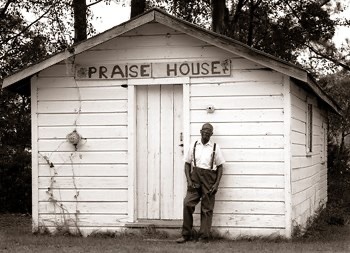
Today, we at My Mind and Me Inc and the Temple of Living Word a 501c3 non profit based in Atlanta are on a mission to rekindle the traditions of the past and return to our Southern hoodoo roots. Our goal is to open our own Praise House in Atlanta, where hoodoos, practitioners of African Traditional Religions (ATRs), and individuals of all backgrounds can practice openly, without judgment. In this sacred space, we will offer open altars, prayer sessions, spaces for practitioners to teach, and, of course, the continuation of the cherished tradition of ring shouts.
To make this vision a reality, we need your support. Be a part of a bigger picture, a story of resistance and resilience. Donate today and help us build a Praise House that stands as a testament to the enduring strength of culture, faith, and unity. Together, we can create a space where souls find solace, healing, and renewal.
Join us on this sacred journey, and be a part of history.
Please SHARE! SHARE! SHARE!
Atlanta family TAP IN
@mymindandmeinc @realconjuhwoeman
#hoodoo#medium#ancestor veneration#witch#rootwork#black women#conjure#prophet#tutnese#luxury#gofundme#nonprofit#healing#donate
112 notes
·
View notes
Text
Good works are a result of salvation
Ephesians 2:10 For we are his workmanship, created in Christ Jesus unto good works, which God hath before ordained that we should walk in them.
Titus 3:8 This is a faithful saying, and these things I will that thou affirm constantly, that they which have believed in God might (be careful to maintain good works). These things are good and profitable unto men.
Titus 2:14 Who gave himself for us, that he might redeem us from all iniquity, and purify unto himself a peculiar people, (zealous of good works).2.15 These things speak, and exhort, and rebuke with all authority. Let no man despise thee.
2 Corinthians 5:9 Wherefore we labour, that, whether present or absent, we may be accepted of him.
2 Timothy 3.16 All scripture is given by inspiration of God, and is profitable for doctrine, for reproof, for correction, for instruction in righteousness:3.17 That the man of God may be perfect, thoroughly furnished (unto all good works).
James 2:14 What doth it profit, my brethren, though a man say he hath faith, and have not works? can faith save him?2:15 If a brother or sister be naked, and destitute of daily food,2:16 And one of you say unto them, Depart in peace, be ye warmed and filled; notwithstanding ye give them not those things which are needful to the body; what doth it profit?2:17 Even so faith, if it hath not works, is dead, being alone.2:18 Yea, a man may say, Thou hast faith, and I have works: shew me thy faith without thy works, and I will shew thee my faith by my works.2:19 Thou believest that there is one God; thou doest well: the devils also believe, and tremble.2:20 But wilt thou know, O vain man, that faith without works is dead?
#sermon#faith in jesus#jesus#animation#scripture#christian quotes#bible verse#christianity#christian art#christian inspiration#christian
18 notes
·
View notes
Text
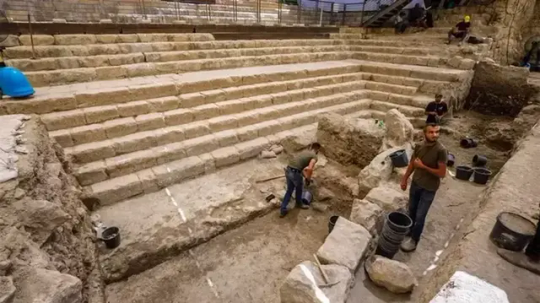
Biblical Steps Where Jesus 'Healed a Blind Man' Unearthed by Archaeologists
In Jerusalem, a recent excavation effort uncovered stairs that had been hidden for more than 2,000 years near the spot where the New Testament says Jesus treated a blind man.
A new excavation project in Jerusalem has unearthed steps unseen in over 2,000 years at a place where the New Testament records Jesus as having healed a blind man.
The Israel Antiquities Authority, the Israel National Parks Authority and the City of David Foundation early this year announced that the Pool of Siloam, a biblical site cherished by Christians and Jews, will be open to the public for the first time in 2,000 years in the near future.
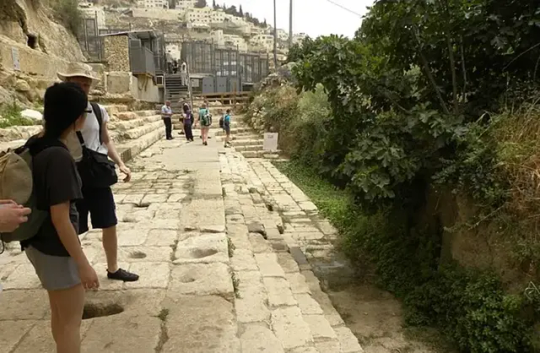
In recent weeks, archeologists achieved significant progress in the excavation, unearthing some eight steps descending into the Pool which had not been seen in 2,000 years — around the time when Jesus walked the Earth.
“The ongoing excavations within the City of David — the historic site of Biblical Jerusalem — particularly of the Pool of Siloam and the Pilgrimage Road, serve as one of the greatest affirmations of that heritage and the millennia-old bond Jews and Christians have with Jerusalem,” Ze’ev Orenstein, director of International Affairs – City of David Foundation said.
“Not simply as a matter of faith, but as a matter of fact,” he added.
The City of David Foundation is a non-profit organization established in 1986, “dedicated to the preservation and development of the City of David and its environs, and is committed to connecting people of all faiths and backgrounds to ancient Jerusalem.”

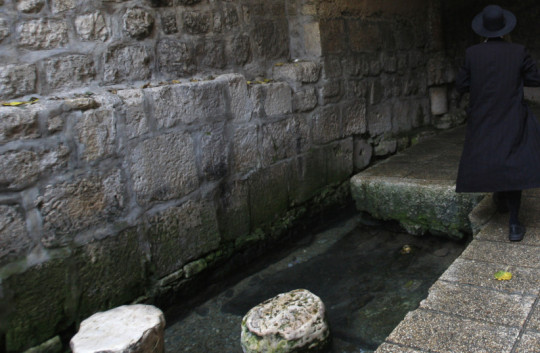

“The half-mile running through the City of David, from the Pool of Siloam in the south, continuing along the Pilgrimage Road, up to the footsteps of the Western Wall, Southern Steps and Temple Mount, represents the most significant half-mile on the planet,” Orenstein said.
“There is no half-mile anywhere on Earth which means more to more people – not to millions, but to billions — than the half-mile that is the City of David,” he added.
The pool was first built roughly 2,700 years ago as part of Jerusalem’s water system in the eighth century B.C.
The construction unfolded during the reign of King Hezekia as cited in the Bible in the Book of Kings II, 20:20, according to the two Israeli agencies and the City of David Foundation.
According to estimates, the Pool of Siloam passed through many stages of construction and reached the size of 1.25 acres.
According to a passage in the Gospel of John, Jesus restored the sight of a man born blind at the Pool of Siloam.
A small section of the pool, which has been fully excavated, has been accessible to the public for several years.
The vast majority of the pool is being excavated and will either be opened piecemeal or once the entire site is unearthed.

Rev. Johnnie Moore, president of the Congress of Christian Leaders, told Fox News Digital in January that, “In the Pool of Siloam, we find evidence of history preserved for us, revealed at just the right time.”
“Theologically, it affirms Scripture, geographically it affirms scripture, and politically it affirms Israel’s unquestionable and unrivaled link to Jerusalem. Some discoveries are theoretical. This one is an undeniable. It is proof of the story of the Bible and of its people, Israel,” he said.
A stroke of luck revealed the pool in 2004, when infrastructure work carried out by the Hagihon water company uncovered some of the pool’s steps.
The Israel Antiquities Authority, under supervision of professors Roni Reich and Eli Shukron, launched a survey.
As a result, the northern perimeter, as well as a small section of the eastern perimeter of the Pool of Siloam, were uncovered.
“Whether in the halls of the United Nations, ongoing efforts by Palestinian leadership, or on university campuses, Jerusalem’s Biblical heritage is under assault,” said Orenstein.
Orenstein noted that in few years time, visitors to the City of David will be able to witness the factual history for themselves and “see with their own eyes, touch with their own hands, and walk with their own feet upon the very stones their ancestors walked thousands of years ago, as they made their way to Jerusalem on pilgrimage.”

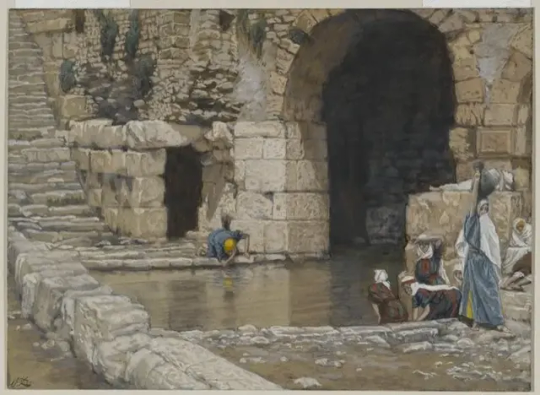

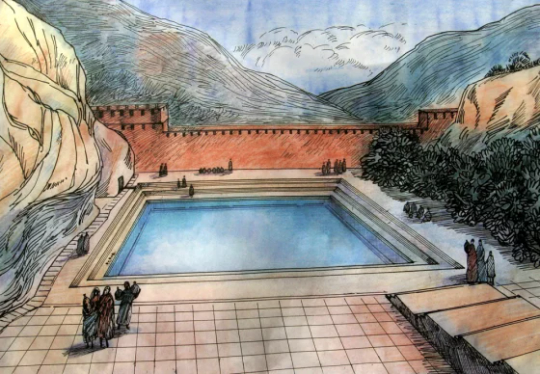
#Biblical Steps Where Jesus 'Healed a Blind Man' Unearthed by Archaeologists#Jerusalem#Israel#City of David#Pool of Siloam#Pilgrimage Road#King Hezekia#Jesus#Jesus Christ#ancient artifacts#archeology#archeolgst#history#history news#ancient history#ancient culture#ancient civilizations#ancient israel
130 notes
·
View notes
Text
Day 57
Brightmarket
Up at first light in the Brightmarket inn for a morning meal.


Stopping by the docks, I discovered that Gulahni's stall had been robbed again in the night, along with her storehouse this time. She directed me to her storehouse where I began searching for traces of the thief.


Before I reached it, I was hailed over by an Oseram in his workshop, Fernund. He wanted to know all about my spear and how it worked, but I didn't like his tone. This wasn't an observer innocently curious about the workings of ancient technology, this was a profiteer looking to scrounge shards, keen to sell his secrets to the highest bidder. The Eclipse are doing enough damage with their corrupted machines without Oseram pawning legions of them to whoever can pay.
Fernund appeared to brush off my refusal to share the trick to tame machines, though I could tell he was stuck on the subject. Instead, he told me about an ancient piece of technology up on Dusk Mesa in the southern reaches of the Jewel, too high to reach, but undoubtedly valuable. If anyone could tell that from a glance, it'd be an Oseram, but I saw Fernund's proposal for what it likely was—an ambush, and another way to get at my spear. I said I'd think on it and went on my way.

In Gulahni's storehouse there were clear signs of a disturbance; grooves dug into the boards by shifted barrels and a stolen cart. The killer must have been meaning to last themselves a while this time. The amount they took was frankly ridiculous, and heaps of it had been dumped or lost along the cart tracks, ending in a huge mound being set into by boars. Were they trying to feed a whole camp?


The cart itself had been abandoned not too far from there, where I picked up footprints, spaced and deep enough to indicate running, then finally came to a flock of Glinthawks harassing a Carja pauper dressed in rags, ducking defenceless from their attacks and shouting prayers to the sun. I took care of the Glinthawks, but as I was the thief ran away. I finally caught up to him at a small campsite rigged up in a narrow pass, along with a massive amount of stolen food, sure to rot before it could be eaten by only one man.

His name was Dekamin, and though I would happily have offered my own name, he preferred to call me savage, though not in a malicious way, which almost made it worse. He was an escaped refugee from Sunfall, and he'd been stealing from Gulahni because he thought he was ostracised from Carja society for being a traitor. He would be killed if he showed himself. That must be what they tell the people in Sunfall to stop them from trying to flee. It must have been bad enough that Dekamin decided it was worth it anyway. I assured him that Gulahni and the people of Brightmarket would do no such thing, and he should go apologise to her for damage caused.
He also seemed to think that the Glinthawks had been sent by the sun as divine judgement to punish him for his trespasses. I know that Glinthawks hold a special significance in Carja scripture, but this was extreme. To convince him to return to the docks I told him that, yes, begging forgiveness would indeed absolve him of the sun's wrath.


With Dekamin on his way, I continued a little further west to hunt. Overriding a Snapmaw on the riverbank to help it fight the rest of its herd. I picked up a metal flower as I worked my way around the banks. There aren't any easy ways across the lake without swimming in view of the watchtowers, and the banks are too steep to climb. I was lucky to get away with it last night, and after what I did at the riverside fortress, and the fort on the road to Sunfall, they're sure to be tightening security. The Eclipse will be out in force too. My best bet is to enter from the east, maybe even the north.

On the way back east, I came across a bandit clan beset by machines. I enjoyed watching them for a while. They may be deadly against unarmed outlanders, but in the wilds, at the mercy of the machines, they're useless.


I spotted a climbing trail down to the Jewel floor marked by Banuk flags and paintings. As I was hoping, another figurine was waiting at the top of a pillar of stone, with stunning views of Meridian across the way.


I set off southwards toward Sunstone rock to give Janeva news of her missing prisoners, and collect my payment of course. On the way I was attacked by yet another group of bandits. Nil really started grieving too early.


I arrived at Sunstone rock in the late afternoon. Janeva said he knew just by the look on my face what fate had befallen the prisoners. His justice was done—the old fashioned way, just as he liked it. On payment given, he seemed to want rid of me. Pride wounded by asking an outlander for help, is my guess. The repairs to the prison wall were slowly coming to fruition, and it didn't seem like Nil had gone and gotten himself locked back up in a cell, so that was good. I left Janeva to his royally-granted post and rode back north east for Dusk Mesa.


Slipping inside a crevice in the mesa, I spotted a crate up high on the rock wall. Probably an empty crate, but I made my way to it regardless, careful to note the layout of the terrain (cramped, enclosed, and with only one exit. Nicely picked, Fernund). When I reached the box, finding that it was indeed empty, Fernund slunk out from the foliage and gloated at my gullibility before setting his mercenaries upon me. I tried to warn him before he did. I've taken down worse than him, and I know my reputation is exaggerated by leagues despite all I've done to substantiate it. No shot.

There were only five of them, and in the dense vegetation and boulder coverage, it was easy to hide from them and catch them unawares. They also had the brilliant idea to split up and comb the area in pairs. They were all dead in a minute or two, but by then Fernund had already fled.

I took my time combing the area for anything that was actually useful before pursuing him. Some good hunting and herb gathering, then I pressed on. On machine back I'd catch him quick enough.
I found no sign of him on the road, combing for tracks with my Focus, so I reasoned he must have fled for Meridian after all, despite it being the first place I'd look. They say a man can disappear in a city so large. Well, not this man.

I tried not to draw attention to myself once on the docks. Hard when everyone who walks by feels the need to shout their gratitude for saving their king's life to the water and sky. Eventually I spotted Fernund on my Focus, hiding out in a workshop.

He spotted me before I could creep up on him, then ran up the stairs, pursued, and pounded on the doors in desperation. I just waited patiently for him to stop.


He was quite certain I was going to kill him right there in the middle of a peaceful, heavily populated village. That's what savages do, I suppose. He begged me to settle for a finger, or an arm, but I could tell he was more foolish than dangerous, if in the possession of enough shards to hire dangerous people. I let him off with a warning, telling him to spread the story of his little mishap far and wide, and to exaggerate as much as he liked. Hopefully that'll be the last of greedy delvers trying to get at my spear.

On the rooftops as the stars came out, then down to one of the village's bedhouses to sleep. One decent thing about this reputation of mine—it gets me into establishments around Meridian free of charge. And no one cares where I climb.
#lol her inner elbow gets all deformed when bending it. didn't fix that in the remaster. It's most notable in carja silks light bc the#forearm armour doesn't extend all the way to the eblow like most do#hzd#aloy#horizon zero dawn#aloy sobeck#aloysjournal#hzd remastered#photomode#virtual photography#horizon
9 notes
·
View notes